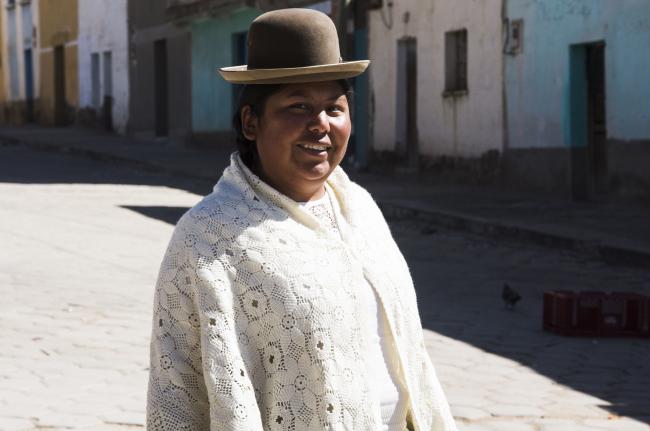
Read a Spanish version of this article here.
Bertha Quispe was 28-years-old when she was elected mayor of Collana, a small town in the Bolivian Altiplano of just over 5,000 inhabitants, who work primarily in ranching and open-pit mining. Quispe is young, an Indigenous Aymaralike most of the inhabitants of Collanaand originally from a small community in the municipality.
She entered a world dominated by men in a country where women’s political participation is rapidly growing. Since 2014, a majority of the national parliamentarians have been women, and since the 2015 municipal elections, women have had a 51 percent of representation in municipal councils. However, Quispe is one of only 29 women mayors in Bolivia: only 8 percent of the country’s municipalities have a female mayor.
Quispe is the first woman mayor of Collana. All of the town’s previous mayors were male, older, and lived in the municipality’s main urban center. Once elected, those surrounding herIndigenous authorities, local union representatives, and office visitorswere predominantly male.
Quispe had initially studied in the municipality but completed high school in the city of El Alto, an hour away by public transportation. There, in the second largest city in Bolivia, she majored in social work before returning to her village, where she became a schoolteacher and began to participate in grassroots organizations, such as the Sindicato de Mujeres Campesinas Bartolina Sisa (Bartolina Sisa Women Farmers’ Union).
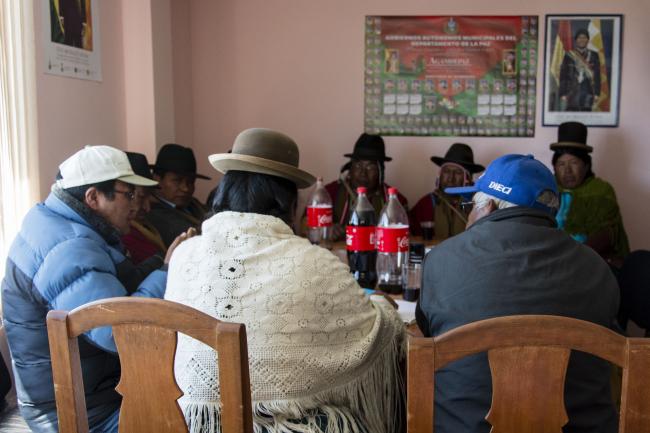
Leading up to the 2014 municipal elections, each of the seven territories that make up Collana held local caucuses under the Movement Towards Socialism (MAS), the party of President Evo Morales, where they created an assembly of proposed candidates for mayor and councilor positions. Guided by principles of gender equality and complementarity, each assembly was required to propose two candidates: a man and a woman. They consulted Quispe by phone and she accepted to run. She said she identifies with “the process of change” Morales represents.
Soon after, an assembly chose Quispe to represent the MAS in the local election. On March 29, 2015, Quispe won with a small margin of 51 votes. The victory was so close that her party was left with a minority in the Council, holding just two of five seats. This was the outcome of some voters having supported her mayoral candidacy but having chosen others outside of the party for the council.
Yet a few months after she became mayor, in June 2015, Quispe began to suffer political harassment and violence. There was some ongoing tension between councilors and other male social leaders, but the real conflict set off at the end of February 2016.
Quispe had devised a new urban planning structure that changed the boundaries between the different communities of Collana. Her opponents accused her of favoring her community, Ichuralla Chico, and of acting without the approval of the Council, which she denies. “Misunderstandings have begun to lead to misinterpretations of the initiative,” she said. Councilors, an Indigenous leader, and the president of the local mining cooperative CIMCO, which is the main local economic power with 1,200 partners and another 300 employees, lodged this accusation at meetings in late February where Quispe was not present. The complaint triggered a protest in the main town and a group of people managed to shut down the City Council offices.
On February 28, a public presentation on municipal accountability was scheduled but ultimately replaced by a demonstration, complete with firecrackers and dynamite, followed by an assembly. The tense and violent atmosphere prevented Bertha Quispe from participating. “We entered the assembly and there were shouts of ‘get out;’ when I wanted to speak, they did not allow me … ultimately I had to leave to protect my physical integrity, because the manifestation was quite ugly,” she recalls. Her opponents demanded her resignation without allowing her to defend her stance.
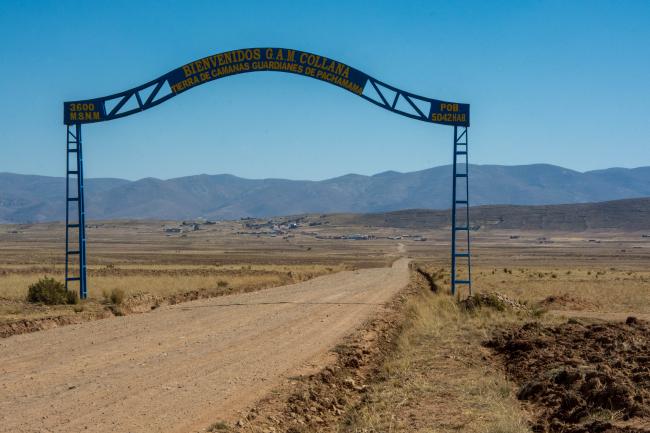
Two weeks later, Quispe’s political opponents lined up at the entrance to the municipal offices. Quispe, who refused to resign her post, spent four months unable to enter her own office or appear publicly in the main town of Collana. During that time, she continued carrying out her duties as mayor, but had to move the municipality’s activities to a smaller community and to the city of El Alto.
Bolivia has the third-highest proportion of women lawmakers in the world, according to the Inter-Parliamentary Union. Only Cuba, which has no conventional elections, and Rwanda are ahead. This is the result of an electoral law adopted by the Plurinational Legislative (ALP) of Bolivia Assembly in 2010, which requires half of all party nominees at the federal, state, and local level be women.
As a result of this law, women jumped from occupying just 28% of the seats of the Plurinational Legislative Assembly (ALP) in 2009 to achieving full parity after the 2014 elections. During the 2015 administration, Gabriela Montaño presided over the Chamber of Deputies and the three caucuses leaders were all women. Now there are 70 women in the Chamber of Deputies of a total 130 members, and 17 female senators out of a total of 36. In all, 52.4% of ALP members are women.
The effects of this electoral reform were also apparent at the municipal level. While in 2004, only 18.7 percent of elected councilors were women, in 2015two elections and an electoral reform later51 percent of elected councilors were women, according to a report from the main network of women’s organizations in Bolivia.
The increase in representation of women has put the issues of harassment and political violence in the spotlight. Katia Uriona, President of the Supreme Electoral Tribunal (TSE), explains that women face additional obstacles in the institutions they confront. “Women enter a patriarchal and sexist system that generates mechanisms of contention, exclusion, violence, and political harassment,” she says. These phenomena have become more visible because “previously there were no women in politics.”
The problem of harassment and political violence with gender motives has become such an issue that in 2012 Bolivia pioneered a specific law to address it. Law 243, celebrated by UN Women as “a historic law,” defines harassment and political violence carried out against women or their families, whether they are candidates, appointed officials, or elected officials, with the aim of “shortening, suspending, impeding, or restricting their exercise of public office or compelling them to perform, against her will, an action or incur an omission in the performance of her duties or in the exercise of her rights.” The law differentiates between harassment and political violence according to the severity of the crimes. That is, harassment and political violence are acts against women specifically aimed at restricting their political rights. This includes specific acts such as spreading false information about the activities of women politicians to discredit their management, or pressuring a woman to resign from an elected position before finishing her term. In Collana, Bertha Quispe suffered both.
Bernarda Sarué is the executive director of the Association of Councilors of Bolivia (Acobol), a support network for women in local office that emerged in 1999 and is the main driving force of the law against harassment and political violence. According to Sarué, Quispe’s confrontation of local power in trying to create a modern plan for resource use in the municipality, in particular the mining cooperative, sparked the conflict in Collana.
Quispe admits that she raised several initiatives that could have impacted the mining cooperative in meetings with the Council: a check of their operating licenses, an inquiry into tax records, and a limit on the environmental impact of open-pit mining. When leaders of the cooperative heard about this, the harassment began.
When Quispe filed a criminal complaint under Law 243, the presumed instigator of the harassment was Antonio Tancara, director of the cooperative, who was in preventive detention between May and July. The other was Zenobio Chambilla, the man who lost the municipal election against her. According to the Plurinational Constitutional Court decision from August 22, 2016, Tancara used his power to mobilize workers against the mayor under threat of salary discounts and fines.
Bertha Quispe believes that, beyond being able to affect mining interests in the territory, she suffered harassment for being a young woman and coming from a small community. In separate interviews, the two Collana councilors acknowledged having suffered discriminatory practices from the other three councilmen townspeople. Although neither of them reported these acts, what they suffered falls under the law against violence and political harassment.
María Luz Chipana, of the center-right opposition party National Unity, has also accused male councilors of questioning her experience for being too youngshe was 25-years-old when she was electedwho did not attend her official meeting calls and tried to remove her from her duties when she became pregnant during her term. Chipana claims that the Council went so far as to withhold a maternity subsidy for all women through the municipalities.
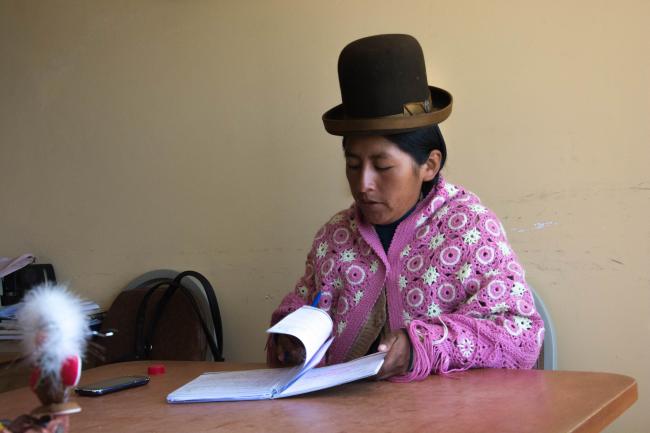
Preventing an elected woman from participating in official meetings, restricting their reinstatement after a justified leave, or discriminating against a public authority for being pregnant or recovering from childbirth are three examples included in Law 243 of harassment and political violence.
Chipana says she had to pay legal advice out-of-pocket to resolve the situation. She tried to report political harassment to the then-president of the Council, Antonio Tito, of the MAS, who she says prevented her from attending and voting in official meetings. She didn’t pursue the complaint because she did not trust the process to come out fairly, and she was facing threats.
Councilwoman Graciela Mamani, a cattle rancher and mother of seven adult children, also suffered political violence. After the mayor filed a criminal complaint for political harassment, people close to the president of the cooperative detained Mamani for eight hours in the town’s church without even allowing her to communicate with her family, accusing her of complicity with the mayor because they belonged to the same party. Mamani did not denounce the occurrence because she did not want to bring harm to her constituents. “It was a clear case of political harassment. But because I love my people I did not want to make the denunciation,” she says.
In Mamani’s opinion, the mayor had the right to make a formal complaint, but believes she should have tried to solve things in a different way. “First she had to face the people. If they did not listen, then she should have made the complaint.”
Harassment of women politicians occurs at all levels, but it is especially strong at the local level, where public exposure is lower and complaint mechanisms are less accessible. Acobol reported 65 complaints of harassment and political violence towards councilwomen during 2017, but this year the statistics have already superseded this number. In the first half of 2018, they received 79 complaints. Despite Acobol’s efforts, most of the files are lost in a sea of bureaucracy and processes that are delayed, such that few actually conclude.
During a period of 21 months between 2016 and 2017, Acobol received 89 complaints that affected 114 victims, according to data provided for this investigation. Twenty of them were criminal complaints, but not one has resulted in a firm conviction since 2012 when the law against harassment and violence was approved, which opened the door to sentences of up to ten years for perpetrators.
Another limitation for political equality is the gap between the participation of women in legislative bodies and their low representation in executive positions. Women are still a minority at the highest levels of government: there is no woman governor in the nine regions and, in the national government, only 3 of 18 ministers are women.
Gabriela Montaño is the woman with the most political power in Bolivia. As leader of the MAS, president of the Senate between 2012 and 2013, and president of the Chamber of Deputies since 2015, she links political harassment at the municipal level to the fact that their political power is still considered an aberration.
“The fact that women have entered decision-making roles of public responsibility generates a reaction from forces that want things to remain as they were. Reacting violently is fundamentally linked to allegations of corruption,” says Montaño .
Sarué, the director of Acobol, has a similar view. “We have realized that many of our fellow councilors, at least in municipalities with dispersed and rural populations, are women who refuse to sign certain documents,” he says, alluding to resolutions that allow corrupt practices. “The higher the level of education of our fellow councilors, the greater the harassment and violence,” she emphasizes.
Montaño believes that political harassment against parliamentarians like her is less frequent because a national assembly member has more resources to denounce, because such a situation “could quickly generate a public scandal.” However, she recognizes that in previous stages of her political career, she did suffer harassment, especially through her family.
“Those who oppose us do not usually attack us directly, but rather attack who we love. Our families, our children, our partners. They judge us on the orderliness of our personal lives in ways they would never judge a man,” she reflects.
Six years after its passage, it is clear that the law against political harassment and violence has not managed to eradicate the phenomenon. For Uriona, president of the Legislative Body, the law is valuable because it recognizes harassment and political violence as a crime and is a mechanism to demand rights. “The law is not the mechanism that changes the harassment, but it generates conditions through which women are going to fight protection, exercise, knowledge of rights,” she says.
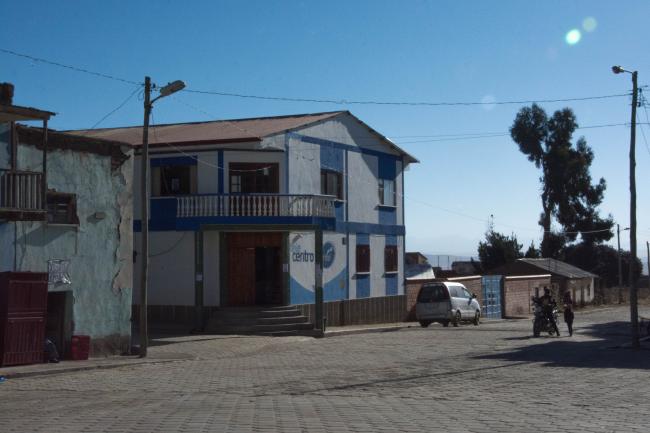
Mayor Quispe was able to solve her case, partly thanks to the law. She won a constitutional protection that allowed her to return to her position and to her offices, but that did not automatically guarantee the restitution of her rights. She had to negotiate with the people who harassed her, because when she returned to the town hall, the government could not provide her with adequate police protection.
In contexts of political violence, the law provides for the formation of an inter-institutional commission with representation from the ministries of Justice and Government, the Ombudsman or Acobol itself. That is what happened in Collana, and a delegation from that commission went to the town to support the mayor when she returned. Her critics attacked her vehicle and kidnapped three members of the committee. Quispe negotiated their release and her return to the municipal government in exchange for withdrawing the criminal complaint she had submitted against the president of the cooperative and who had been her opponent in the elections, in addition to six others civic leaders who did not go into preventive detention. They also forced the resignation of the municipality’s legal counsel, Christiam Nattes, a young lawyer very close to the mayor.
As a result of withdrawing the charges, Tancara and Chambilla regained their freedom and the town gradually returned to its normal rhythms. Quispe says that, as a result of the instability, the municipality lost investment opportunities in national programs and international funds.
For some, it appears that political violence is a crime that, despite having been made visible, remains unpunished. “To date we do not have a clear, condemnatory sentence that shows clear and legitimate jurisprudence that shows that political harassment exists,” says Nattes, Quispe’s former legal counsel.
Six years after the unprecedented law, cases of impunity remind the country of its outstanding debt to justice and political equality beyond the numbers and formal rights. Women already occupy the public spaces, but they still have to radically transform those spaces in order to exercise political power free of violence and with full political rights.
Alice Campaignolle is a multimedia journalist and freelance correspondent for French-speaking media in Bolivia.
Irene Escudero is a journalist based in Nairobi as Sub-Saharan Africa correspondent for Spanish News Agency EFE and former correspondent in Bolivia.
Carlos Heras is a freelance journalist based in Mexico City and former correspondent in Bolivia for Spanish News Agency EFE.
This story is part of Where Women Make the Laws , a multimedia project supported by the European Journalism Center .

